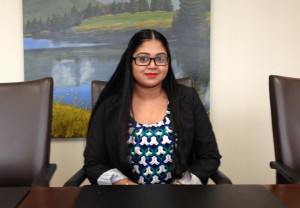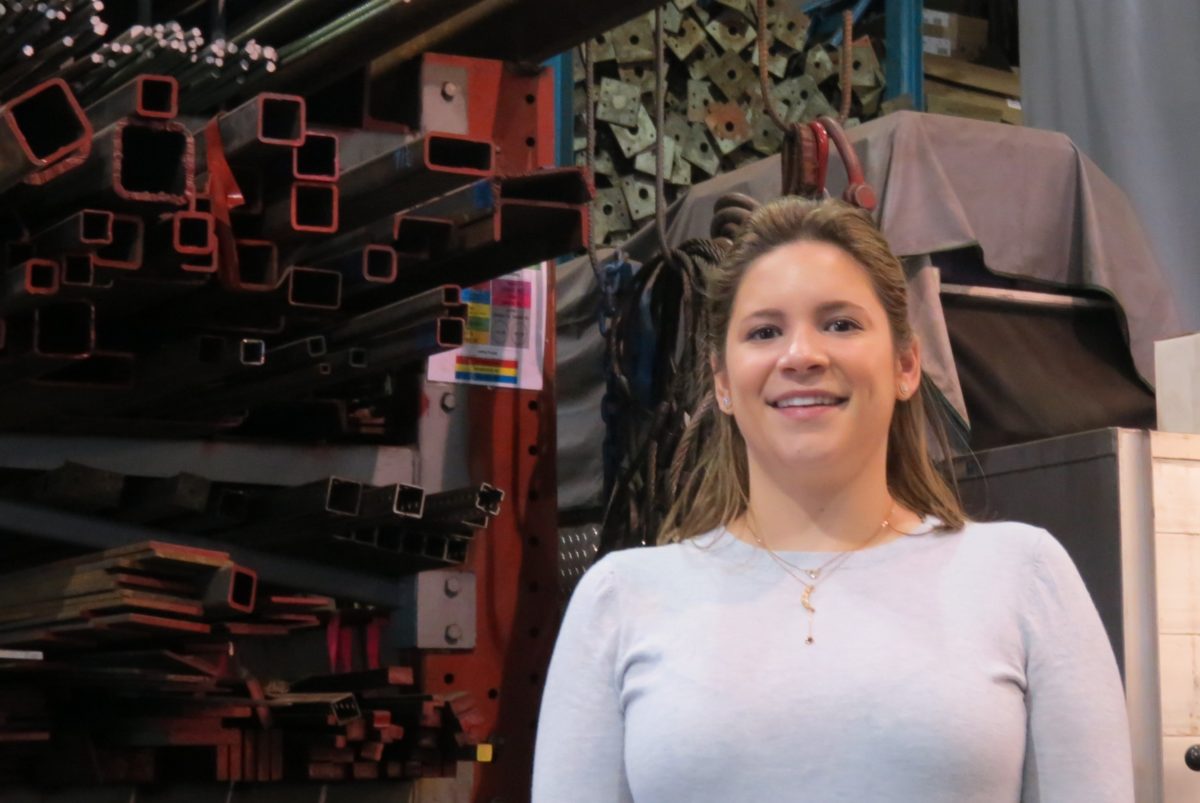From an early age, Vidya Singh had a strong interest in teaching.
As a student at Yonkers”™ Lincoln High School, she was considering a path toward a career in education, but was admittedly unsure.
That all changed in 2011, when she was accepted into the Westchester County Bar Association Diversity Committee”™s summer intern program during her senior year.
She was placed at Keane & Beane PC, a White Plains-based firm that had been a regular participant in the WCBA intern program since it began in 2007. Singh, who was born in Guyana and moved to the United States when she was 8, did clerical work, sat in on courtroom proceedings and was exposed to the inner workings of law all before she began college.

- Vidya Singh, now a paralegal at Keane & Beane PC, began at the firm as an intern through the Westchester County Bar Association Diversity Committee”™s summer internship program. Photo by Evan Fallor
She stayed at the firm as an administrative assistant throughout college and was hired as a paralegal at the firm last month.
“The program definitely changed my perspective about law,” said Singh, 21. “It”™s not just about going to court and finding someone guilty. It”™s all about the in-betweens and going through the procedure to settle your case.”
The program, now in its ninth year, was designed to expose high school juniors and seniors from diverse backgrounds to law. The students that take part are from socioeconomic, cultural and racial groups that are statistically underrepresented in the legal field. There are almost a dozen participating firms in Westchester County, and each receives one intern per summer.
It is organized by the WCBA”™s Diversity Committee, whose mission is to promote inclusion. Its co-chair, Karen T. Beltran, an assistant county attorney, serves as the program coordinator.
Most students, Beltran said, come from the county”™s urban centers, like Yonkers, Mount Vernon, White Plains and New Rochelle.
Students are paid minimum wage and work 20 to 25 hours per week. Beltran said it is mostly clerical work, but students also observe legal proceedings and go on field trips to federal courthouses. She takes students on a group lunch at the end of the program ”” which lasts at least six weeks ”” where they share some of their courtroom experiences with her and what they took away from the program.
“Students are usually very appreciative of the opportunity,” said Beltran, who is in her second year coordinating the program. “There”™s an identified need here, and we”™re trying to address that need.”
The committee first recruits firms who are willing to participate in and sponsor the program, and then recruits students and conducts interviews. Students are then referred to firms, who conduct their own interviews.
Stephanie L. Burns, a member of Keane & Beane and WCBA vice president, spearheaded the summer internship program as a member of the association”™s Diversity Committee. In a statement, she said it has been a “delight” to mentor interns. Judson K. Siebert, principal member at Keane & Beane, echoed that sentiment.
“What we”™ve done is we”™ve utilized them both in terms of working within the office but we”™ve also tried to expose them to various tasks taken by attorneys,” Siebert said. “We give them a sense of what it”™s like day to day working in a law firm.”
After her internship, Singh remained at Keane & Beane as a part-time administrative assistant while studying at Berkeley College, from which she earned an associate degree in criminal justice. She received her paralegal certificate from Pace University earlier this year before becoming a paralegal in education law, municipal law and litigation and dispute resolution practices.
Singh said she hopes one day to go to law school and eventually become an attorney practicing in civil litigation or education law. Now, she”™s helping those whose shoes she was in just a few years ago.
“Every year since I started there have been student interns, some from the same high school I came from,” Singh said. “It”™s been a pleasure training them and telling them of my experience in the program.”
While Singh”™s success story is the ultimate goal of the internship program, Beltran said there are still difficulties. In an industry that has expanded widespread downsizing at private practices in the past several years, Beltran said the WCBA remains transparent with interns about the challenges of entering the legal field.
“When students are in high school, they”™re idealistic,” Beltran said. “Your first job out of law school may not be what you want to do. We explain the real world situations.”





















Law school is financial suicide for many students these days. Now is a horrible time to go to law school.